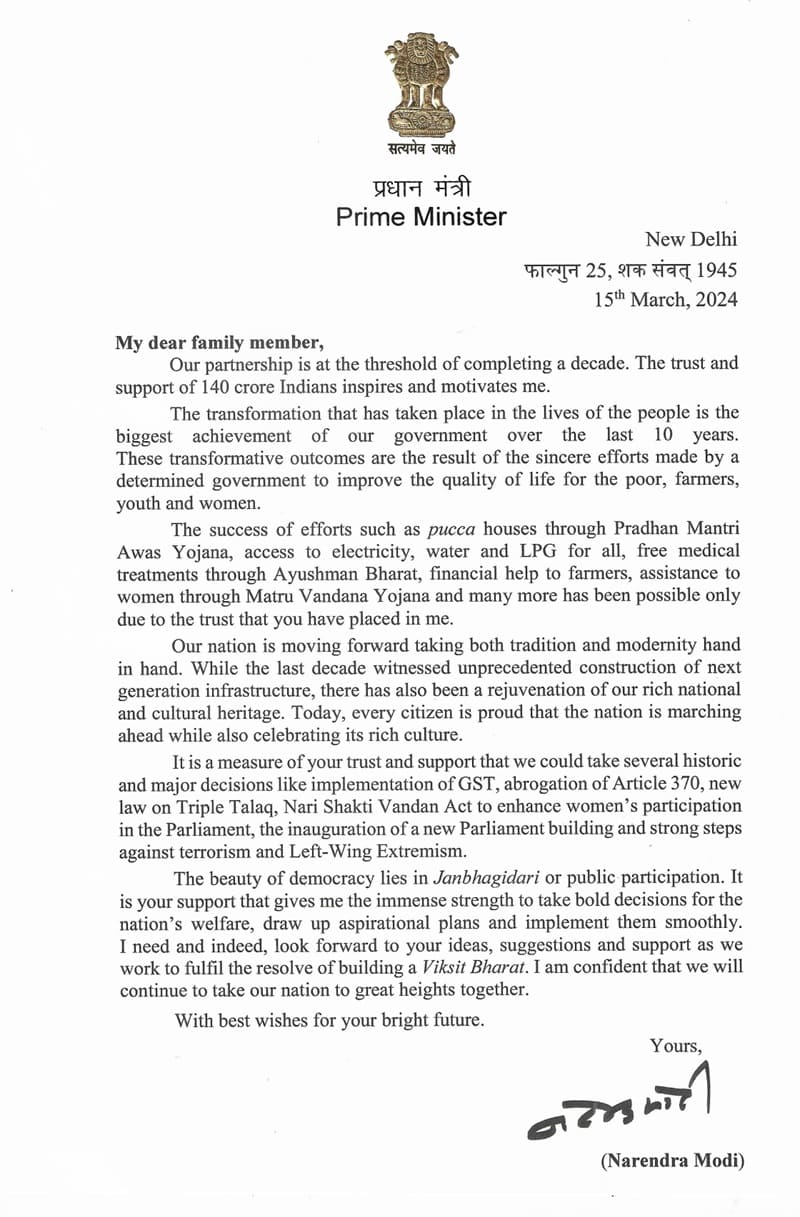In political engagement, the recent WhatsApp message disseminated by the Government of India under the leadership of Prime Minister Narendra Modi marks a significant shift in how leaders connect with their constituents. This innovative approach, facilitated by the Viksit Bharat Sampark Kendra, exemplifies the power of technology in fostering direct and personalized communication between elected officials and the public.
The message, accompanied by a letter from the Prime Minister himself, serves as a testament to the government's commitment to embracing modern communication channels and leveraging their potential to reach out to the masses. By directly addressing each recipient as a "family member", the letter establishes an intimate and inclusive tone, effectively bridging the gap between the decision-makers and the citizens they serve.

While the concept of direct outreach from political leaders is not entirely new, the scale and personalization achieved through this initiative are unprecedented. Imagine receiving a personalized message from the head of state, not just a generic broadcast, but a communication tailored to resonate with each individual recipient. This level of engagement has the potential to foster a sense of belonging and validation among citizens, reinforcing the notion that their voices are heard and valued.
The letter itself is a masterclass in public relations and strategic communication. It skillfully weaves together narratives of progress, achievements, and aspirations, painting a vivid picture of a nation on the path to development and prosperity. From the successful implementation of initiatives like the Pradhan Mantri Awas Yojana and Ayushman Bharat to the celebration of India's rich cultural heritage, the letter presents a comprehensive account of the government's efforts to improve the lives of its citizens.
Moreover, the Prime Minister's acknowledgment of the public's trust and support as the driving force behind these accomplishments is a powerful rhetorical move. It not only reinforces the collaborative nature of governance but also subtly appeals to the inherent human desire for recognition and validation. By crediting the people's support as the catalyst for bold decisions and aspirational plans, the letter effectively cultivates a sense of ownership and investment among the recipients.
Interestingly, the Prime Minister's call for "Janbhagidari" or public participation resonates deeply with the principles of democracy. It underscores the understanding that effective governance is not a unilateral endeavor but rather a collaborative effort that thrives on the ideas, suggestions, and support of the people. This invitation to engage not only empowers citizens but also fosters a sense of responsibility and shared ownership in shaping the nation's future.
While some may perceive this direct outreach as an invasion of privacy or a political maneuver, it is undeniable that the strategic utilization of technology in this manner represents a significant stride in bridging the gap between leaders and the public. By leveraging the ubiquity of platforms like WhatsApp, the government has effectively tapped into the very fabric of modern communication, meeting the people where they are and engaging them in a language they understand.
Ultimately, the true impact of this initiative will be determined by the government's ability to translate the public's feedback into tangible actions and policy decisions. If executed effectively, this direct line of communication could pave the way for a more inclusive and participatory form of governance, where the voices of the people are not only heard but actively shape the nation's trajectory.
In a world where trust in institutions and political processes is often scrutinized, this innovative approach to public outreach presents an opportunity to rebuild that trust through transparency and genuine engagement. By embracing technology and adapting to the evolving demands of the digital age, the Government of India has taken a bold step towards redefining the norms of political communication and setting a precedent for other nations to follow.
As the world continues to grapple with the challenges of effective governance and public engagement, initiatives like this serve as a reminder that progress is not solely measured by infrastructural development but also by the ability to foster meaningful connections between leaders and the people they serve. Ultimately, it is this symbiotic relationship that lies at the heart of a truly vibrant and responsive democracy.
